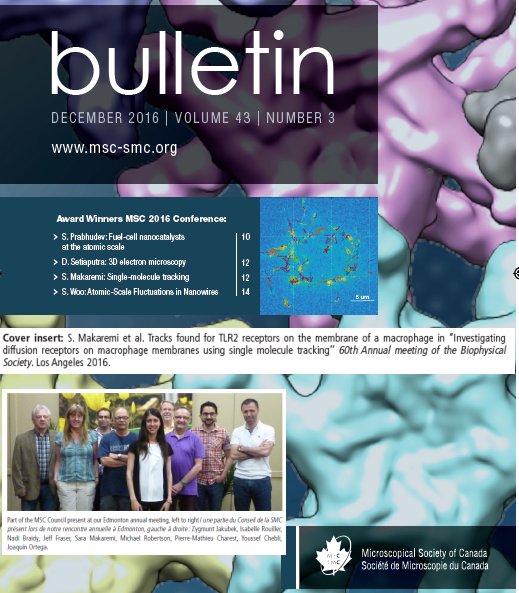Click here to hear Dawn’s interview with Radio Canada on our recent paper on the role of the microbiome in age-associated inflammtion…
Author Archives: Dr. Dawn M. E. Bowdish
Editorial: Breaking Down Walls: Microbiota and the Aging Gut
We’re thrilled that our publication was featured as an editorial in Cell Host & Microbe. Read Drs Erin S. Keebaugh and William W. Ja’s excellent editorial here…..
Publication: Age-Associated Microbial Dysbiosis Promotes Intestinal Permeability, Systemic Inflammation, and Macrophage Dysfunction
Success! PhD candidate Kyle Novakowski gets married.
Sara Makaremi’s PhD work featured in the Microscopical Society of Canada’s bulletin!
Sara is learning how macrophage receptors move through membranes using high resolution microscopy. Her beautiful work was featured in Decembers bulletin. Congratulations Sara!
For the full bulletin, see here.
The Bowdish lab is no longer accepting applications for undergraduate positions for 2017/18.
Thank you for your interest but all summer positions and thesis positions for 2017/18 are now filled.
#TakeABreather at the Lung Association’s Pop-up Park.
On average, everyone takes an astonishing 22,000 breaths per day – something we’re not conscious of doing. And, although breathing is fundamental to life, lung research doesn’t get the attention it truly needs.
November is Lung Month, the perfect time to reinforce and remind Canadians how important it is to #TakeABreather. To capture attention, invite participation and help raise donations for lung research, The Lung Association is launching interactive pop-up parks across Canada.

Joseph Neale is a “Breathing Ambassador” who survived lung cancer when he was only 20 years old. Despite having surgery he got his voice back and is hoping to win a “Grammy for Lung Cancer Research”. Together we answered questions at the #TakeABreather pop-up park at Sherway Gardens. Stories like his remind me that I need to be the best scientist that I can be to make the discoveries that will improve the lives of those living with lung disease.
Highlight’s of the kick off were livestreamed on Breathing as One’s Facebook Page – be sure to check them out!

It was such an honour to hear Joseph’s story of overcoming lung cancer and to share what the research community is working on. We all agreed – more money for lung research!
Remember, everything shared with #takeabreather is being curated at breathingasone.ca – take a look and make your contribution today!
Don’t forget, there are three ways that you can get involved:
VISIT THE POP-UP PARK
- Pop in and take a breather and a selfie, and share it on social
media with #takeabreather
- We even have our very own custom #takeabreather Snapchat filter – but you’ll have to visit to see it!
- Location: Sherway Gardens (25 The West Mall)
- When: Thursday, Nov. 3 (11:00-8:00); Friday, Nov. 4 (11:00-8:00); Saturday, Nov. 5 (10:30-8:00); Sunday, Nov. 6 (12:00-5:00)
SHARE #TAKEABREATHER ON SOCIAL MEDIA
- Can’t visit the park? Instead, show us your favourite time and place to take a breather with #takeabreather
- It could be anywhere, anytime – in a field, on a hillside, at dawn or sunset, at the gym, or watching your kids play
- Tell us why you love breathing, why you love this particular breathing moment, what your breath does for you, and any other breathing thoughts you want to share
- Don’t forget #takeabreather
- All contributions will be curated at BreathingasOne.ca
SPREAD THE WORD
- Challenge your friends, family, and extended networks to #takeabreather by forwarding the information above!
It’s time Canadians stop taking our breath for granted. Through Breathing as One and the #TakeABreather campaign, together, we can lead the conversation, and radically change the way we think about breathing.
Mac in Five: “Lessons from the oldest of the old”.
See article with full links here.
Mac in Five
Lessons from the oldest of the old.
5 Weeks • 5 Professors • 5 Lessons • 5 Minutes a day
Course: Healthy Aging • Lesson #1 of 5
Would you rather live a long life in poor health or a short life in good health? For most of us this seems to be the trade-off but for the select few who become “supercentenarians” (those living to > 110), they seem to have the best of both worlds. Intriguingly, these oldest of the old are usually of sound mind and physically active until their death, and avoid many of conditions or diseases that almost seem to be an inevitable part of old age such as cardiovascular disease, metabolic disorders or dementia. Most of us aspire to an old age like the supercentenarians, which is active and healthy but when ill-health makes its inevitable appearance, the decline is rapid but brief. So how do they do it? Genetics seems to play a role, but there is no magic gene that makes us live longer, nor is there a particular diet, exercise or pill that ensures that you’ll live into the next century. Interestingly, we’ve recently learned that having a healthy immune system may be necessary for long and healthy life.
One of the most provocative studies of the role of the immune system in longevity comes from the study of Hendrikje van Andel-Schipper who was, briefly, the oldest woman in the world. She died of cancer at 115 and donated her body to science. She was remarkable in many regards but from an immunological perspective, she was exceptional because at the time of her death her circulating white blood cells came from only two hematopoietic stem cell clones, as opposed to the thousands or tens of thousands one would expect in a younger adult. Since a diverse repertoire of white blood cells is required to repair damaged tissues and seek out potentially cancerous cells, this loss of stem cells may, ultimately, have caused her death. The oldest old have another interesting immunological feature – low levels of inflammation, which seem to help them resist chronic inflammatory diseases like cardiovascular disease and dementia for longer.
So what can those of us who have not won the genetic lottery do to live long, healthy lives? Although there are some pre-clinical trials in mice and epidemiological data in humans that suggest it will be one day be possible to extend the years of healthy living by taking a pill, we are not there yet. Instead, we can lower our inflammation and extend the years we live in good health by exercising, eating well, maintaining a healthy body weight, and having a robust social network. We may not have what it takes to be a supercentenarian, but we can make the years that we have be the very best that they can be.
Suggested article for further learning: New Scientist
Alumnus update: Former Bowdish lab MSc student, Fiona Whelan, featured by Cystic Fibrosis Canada
Fiona did an MSc in the Bowdish lab (2010-2012) and went on to do a PhD with Dr. Mike Surette. Her research is featured by Cystic Fibrosis Canada. Way to go Fiona!
Dawn discussed why she chose to go into a career in science in the IIDR’s Incubation Podcast Series
Fiona Whelan and Ryan Buensuceso, sit down with the IIDR’s Dr. Dawn Bowdish to discuss how and why she chose science as a career.
Hear the podcast here.
Twitter handles:
Fiona Whelan (@whelanfj)
Ryan Buensuceso (@rcbuensuceso)
Dr. Dawn Bowdish (@MsMacrophage)
Michael G. DeGroote Institute for Infectious Disease Research (IIDR) (@McMasterIIDR)






